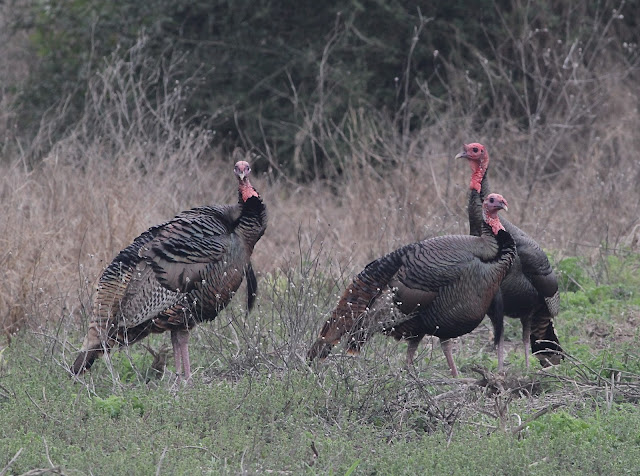A roundup of the week's news of birds and the environment:
"You lookin' at me?" These three Wild Turkeys seem very curious about what I'm doing with that camera!*~*~*~*
Central Park Zoo officials have thrown in the towel. They've given up - at least for now - trying to recapture their escaped Eurasian Owl, Flaco.
*~*~*~*
And back in D.C., the pair of Bald Eagles known as Mr. President and Lotus (for Lady of the United States) have moved into a new nest at the National Arboretum and Lotus has laid at least one egg.
*~*~*~*
In war-torn Ukraine, activists are putting their lives on the line to rescue animals that have been injured or displaced by the conflict.
*~*~*~*
An outbreak of the H5N1 virus has killed thousands of birds and over 700 sea lions in Peru's Natural Protected Areas.
*~*~*~*
A French-born conservationist living in the Brazilian Pantanal has dedicated his life to saving the giant armadillo from extinction.
*~*~*~*
Here are some of the early results from last weekend's Great Backyard Bird Count.
*~*~*~*
*~*~*~*
Did you ever wonder what dinosaurs sounded like? Well, scientists say that some of them sounded quite like birds.
*~*~*~*
Getting separated from their mothers would have been disastrous for two young mountain lion cubs, but Hazel and Holly got lucky.
*~*~*~*
Genetically modified trees are being planted in U.S. forests. The hope is that they will be better able to handle climate change.
*~*~*~*
Here's a report on the wildlife of the Olympic Peninsula in Washington.
*~*~*~*
We tend to take birds for granted as ubiquitous parts of the landscape around us but here are ten species that have changed the world.
*~*~*~*
Why were some animals so much bigger in the past and might they become bigger once again?
*~*~*~*
A new study shows that a stronger El Niño Southern Oscillation (Enso) event might have the effect of speeding up the irreversible melting of Antarctic ice.
*~*~*~*
Recent derailments of trains have brought home the fact that hazardous materials move through communities on those rails every day.
*~*~*~*
New York's sea turtle rehabilitation center is currently treating a record number of sick patients.
*~*~*~*
Earth continues to yield up its secrets. The latest is a previously unknown core that has been discovered at the center of the planet.
*~*~*~*
Here's how Europe is leading the way with renewable energy.
*~*~*~*
Botswana is reporting that an enormous increase in rhinoceros poaching has taken place in the past five years.
*~*~*~*
Jane Goodall has long been a hero of mine and I am not at all surprised to learn that she has a wicked sense of humor!
*~*~*~*
*~*~*~*
An irresponsible person recently abandoned a four-foot-long alligator in Prospect Park Lake in New York. It could have been fatal for the alligator but his story had a happier ending.


At this time on the last two Saturdays, Dorothy, I was in Cuba without internet connection, so I missed the Saturday morning roundup. I am glad to be back with you and appreciate your welcome to my day. The story about animals being bigger in the past got me thinking about island biogeography and the ways in which the size of organisms relates to isolation. If you have never read "The Song of the Dodo" by David Quammen you should go to the library right now and get it! Once you have read it you will have to get your own copy - you won't be able to live without it! All the best and thanks for the roundup. David
ReplyDeleteI just read your reports on the Cuba trip and I encourage any of my readers who haven't to hop on over to https://travelswithbirds.blogspot.com/ and treat themselves.
DeleteI have not actually read the Quammen book although I feel almost as if I had since I've read so much about it, but, based on your recommendation, I will now remedy that.
We have a train track that runs right down the center of my town, and trains pass through an astonishing sixty times a day. It's quite worrisome since most of those are headed to and from chemical plants.
ReplyDeleteDid you have a good Great Backyard Bird Count? I was astonished at how many species (30) I saw over the four days. It looks like there was a lot of participation.
I don't know what to think about genetically modifying trees to cope with climate change.
Unfortunately, I didn't really get to participate fully in GBBC this year for the first time in many years, but I would say that 30 is a highly respectable number. Congratulations!
DeleteThat's disappointing. I ended up participating on three of the four days, so I was very pleased.
DeleteI commend the activists helping animals in Ukraine. It breaks my heart to see the photos. You might also be interested to see the live eagle web cam from Big Bear on my recent post. The poor couple has had to weather a lot lately.
ReplyDeleteI'll be visiting your blog later today.
DeleteI've been keeping an eye peeled for news of Flaco the Eurasian Owl. He's been doing well for himself, so it makes sense that they would give up trying to recapture him.
ReplyDeleteThe concern was that he would not be able to effectively hunt and feed himself, but recently I've seen pictures of him with rats that he has caught so obviously he has been successful. And there's plenty more there to keep him fed!
Delete